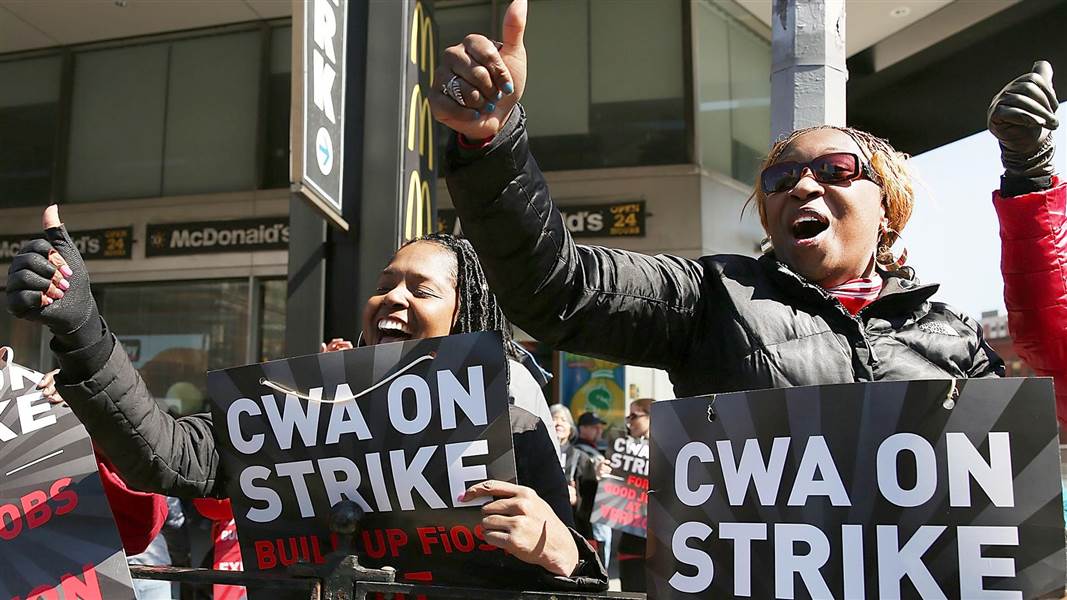
Advertisement
(Freedom.news) Labor unions have long held sway in the authoritarian and increasingly socialist Democratic Party, which helps explain why labor bosses refuse to allow any semblance of choice among their ranks.
As reported by AMI Newswire, legislation aimed at empowering employees to negotiate their own contracts in certain unionized workplaces was introduced by a Michigan lawmaker last week.
A research associate with the Economic Policy Institute, however, said the measure, which carries the label “Worker’s Choice,” could create havoc in the workplace and would further erode the influence of labor unions.
Rep. Gary Glenn (R-Midland) introduced the legislation on Thursday to give certain public employees choices beyond what’s provided by the state’s 2012 right-to-work law. The bill has now been referred to the Committee on Government Operations.
Although the 2012 Michigan law allows workers in unionized workplaces to opt out of paying union dues, Glenn’s bill would give public employees in such situations two choices: Continue to be represented by the union as a dues-paying member, or become a nonmember who pays no dues but negotiates with the employer for wages and benefits as a free agent.
The worker’s choice concept, which has also been championed by Michigan’s nonprofit Mackinac Center for Public Policy, comes at a time when organized labor has been trying to overturn right-to work laws in several states.
Although state right-to-work laws have a history spanning seven decades, unions have been arguing in court that such state laws violate a section of the Fifth Amendment that says private property can’t be taken for a public use unless just compensation is given.

“Unions are arguing that right-to-work laws amount to a taking because, while employees in right-to-work states are not obliged to support a union, these ‘free riders’ are still, by law, represented by unions,” F. Vincent Vernuccio and Jeremy Lott, who are both affiliated with the Mackinac Center, wrote in a blog article last month.
Gordon Lafer, a University of Oregon professor and a research associate at the Economic Policy Institute, doesn’t see the worker’s choice concept solving the free-rider problem.
“You create a total mess,” Lafer told AMI Newswire.
Some employees who opt out of union representation could seek separate grievance procedures or different health insurance and pension plans than what the union has negotiated, Lafer said. Moreover, the workplace could be beset by interpersonal conflict if multiple pay scales are in place.
Typically, people in labor unions make about 15 percent more than what nonunion workers receive, he said. Individual employees usually don’t have the clout on their own to win custom wage and benefits packages, unless they are superstars on the order of Michael Jordan, Lafer said.
“This seems to be anti-unionism trying to find more ways to erode unionism in the public sector,” he said.
If an employer tried to simplify things and only offered nonunion workers the same package that union members negotiated for, there would be a financial incentive for dues-paying members to drop out of the union, Lafer said. The union, in turn, might eventually wither away, he said.
Lafer also emphasized that such proposals as worker’s choice come from groups funded by corporations rather than workers themselves. “This is an attempt to make unions financially unviable,” he said.
Vernuccio, the director of labor policy for the Mackinac Center, however, told AMI that the worker’s choice concept offers a practical alternative to one-size-fits-all union contracts currently negotiated in workplaces. And it would eliminate the free-rider problem in existing right-to-work laws, he said.
“I think this is the start of a national movement for full freedom for both workers and unions,” said Vernuccio, who stressed that employees opting out of union membership would simply be treated like the 87 percent of the workforce who work under no union contract.
The employer might give the nonunion worker a take-it-or-leave-it contract, or else benefits can be tweaked for some employees based on their value to the employer, he said.
“This gives workers the ability to say ‘no thanks’ to unions that want to represent them,” Vernuccio said.
He also pointed to a Google survey of rank-and-file union members across the nation, most of whom seemed generally happy with their union status. Nearly 70 percent of them said that employees in right-to-work states who decide to opt out of paying dues ought to represent themselves when dealing with their employers.
Vernuccio said the Michigan bill was limited to specific state government employees only because applying the worker’s choice model to unionized workplaces in private industry would require Congress to take up a change in federal law.
Supporters also say that the legislation would protect the state’s right-to-work law from legal challenges in the future.
“Both employees’ individual freedom and Michigan’s economy have expanded since we passed right to work in 2012,” Rep. Glenn said in a prepared statement. “But further reform of our state’s labor laws is needed to keep that momentum going.”
Reporting by Michael Carroll, AMI Newswire.
More:
- If We Want The Global Economy To Thrive Again, We Must Throw Out The Leftists
- Yes, Democrats, Voter Fraud IS Real And Trump Is Exactly Right To Be Concerned About It
- The 10th Amendment Is Completely Null And Void As We Have Become A Nation Of Courts, Not Laws And Rights
© 2016 USA Features Media.
Submit a correction >>
This article may contain statements that reflect the opinion of the author
Advertisement
Advertisements
















